Contents
Potato varieties for sandy soil are quite abundant. Due to its inability to retain moisture, the vegetable crop does not particularly like this composition of the soil, but the breeders managed to get several plant species suitable for it. Knowing some of the features and nuances of root cultivation, it is quite possible to collect a decent harvest even in sandy soil.
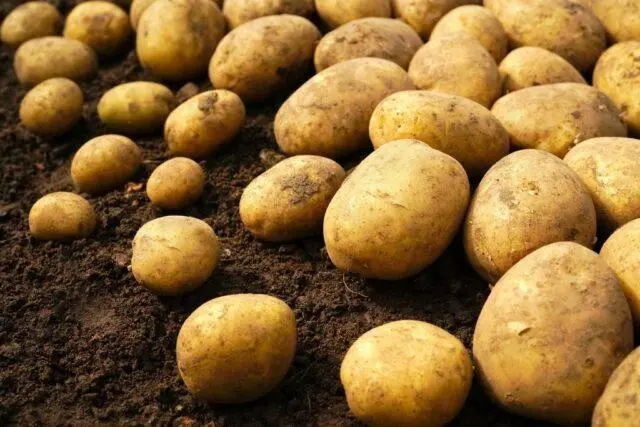
Most of all, potatoes like to grow on loam or sandy loam.
Features of sandy soil
Potato is a crop that loves moisture, so when growing it, gardeners try to make sure that the watering of the beds is of high quality. As you know, water does not stay in the sand for a long time, which is why scientists decided to develop special potato seeds that are productive on sandy soil. Such varieties tolerate heat more easily, cope with drought, calmly react to an insufficient amount of nutrients received. Indeed, in the sand, the effect of fertilizing practically does not occur, since water washes out of it all the necessary substances that settle in the lower soil layer and do not reach the plant. For this reason, they try to fertilize sandy soil with mineral compounds, and to improve its structure, constantly add to it: humus, peat, silt, clay or drill flour.
Pros and cons of sandy soil
Sandy land does not have all negative features, it has quite a lot of advantages. If you plant plants on it according to technology, then the results will be no worse than on any other soil.
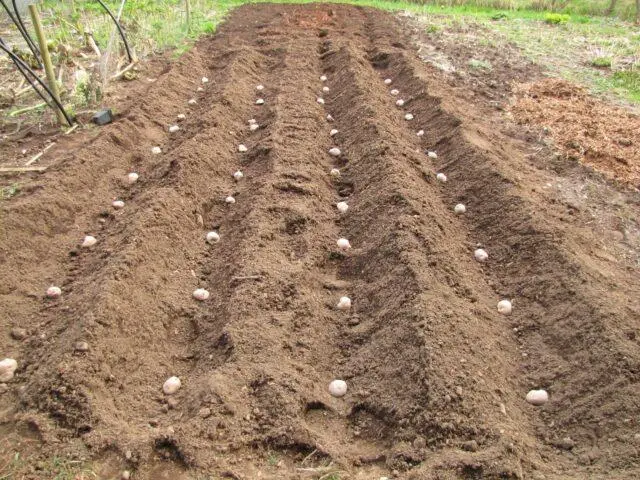
The constituent components of such soil are not only sand, but also a small amount of humus with clay
Advantages:
- flowability, facilitating processing;
- fast erosion process;
- good air throughput;
- fast warming up.
Disadvantages:
- low level of microorganisms;
- lack of moisture;
- the need for additional feeding.
Varieties of potatoes for sandy soil
Owners of plots with sandy soil often think about what plants to plant on it. If you want to grow potatoes, it is important to give preference to specially bred varieties that are resistant to drought. It is also worth understanding that for a good harvest, effort will be required. About which potatoes are best suited for sandy soil – further.
Volzhanin
Volzhanin (Volganin) – a potato variety that gives an excellent yield even in hot and dry climatic conditions. The tubers have a good ripening rate, ready for digging already 2,5 months after planting. The taste and keeping quality of the variety are quite good.
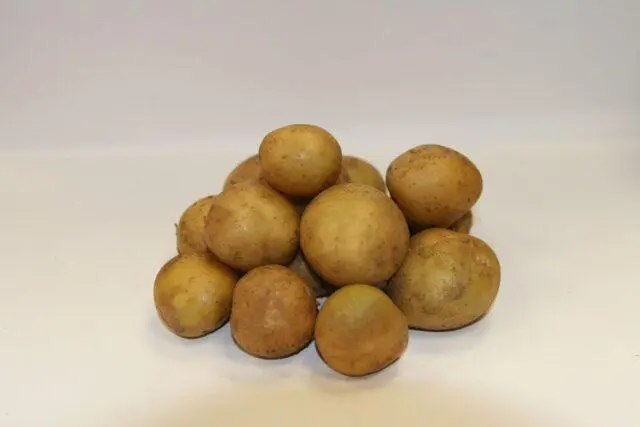
Potato Volzhanin has excellent endurance
Latona
Latona is a Dutch potato variety that is planted on sandy soil, as well as other types of soil. It is unpretentious to weather phenomena, brings a good harvest, has good immunity. The tubers taste good, they do not lose their shape during cooking, they lie for a long time.
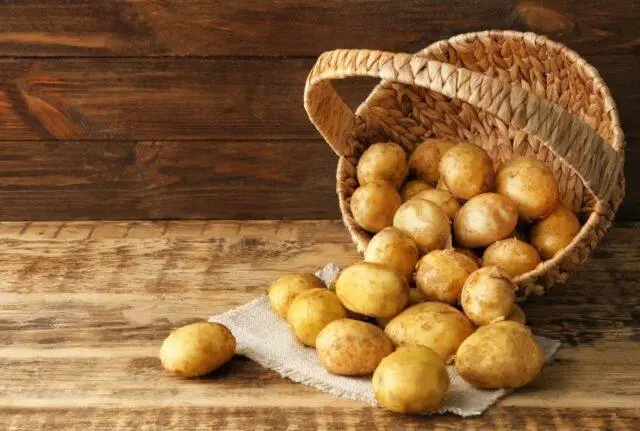
Variety Latona contains a large amount of starch – up to 20%
Typhoon
Typhoon (Tajfun) is a variety suitable for sandy soil, created by Polish scientists. It is quite popular in many countries, has excellent taste, grows to large sizes. A special feature of the variety are powerful and abundantly leafy bushes.
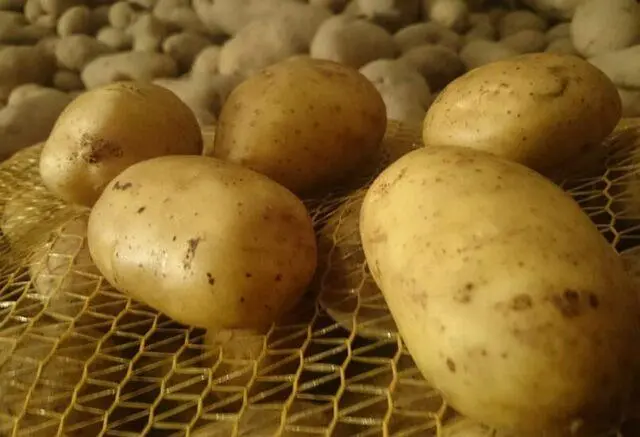
During flowering, Typhoon is covered with large snow-white inflorescences.
Red Scarlett
Red Scarlett is a Dutch potato variety suitable for the sandy soil of Our Country. It is unpretentious to the type of soil, and also has a high resistance to atmospheric changes, gives a good harvest. The variety is rich in vitamins, macro- and microelements.
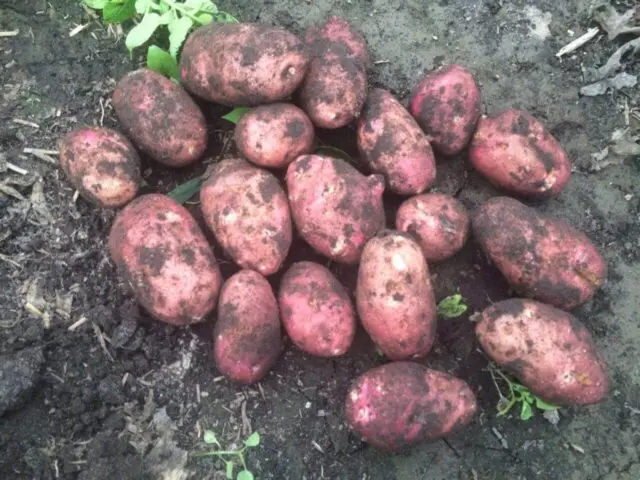
Red Scarlett bears fruit approximately 70 days after planting.
Rosara
Rosara is a variety that is considered a favorite among gardeners. He deserved great love due to high yield, excellent taste, resistance to most diseases. The plant is unpretentious to the vagaries of the weather and feels great on sandy soils.
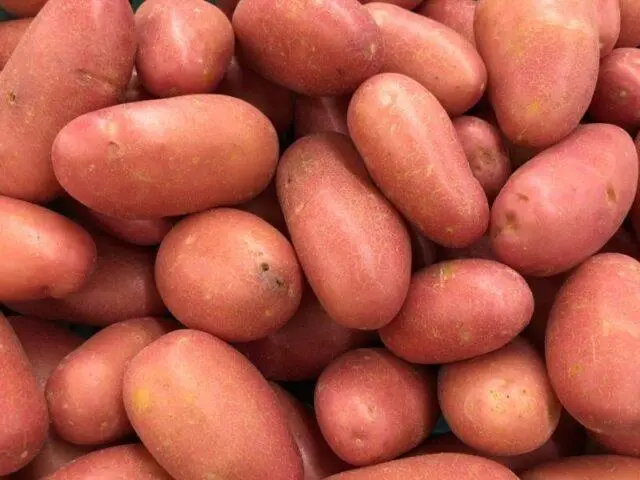
Rosara has high keeping quality
Ramona
A variety of potato Ramona (Romano) was bred by scientists specifically for regions with a hot climate and other unusual conditions for the plant. The tubers of the variety have a good taste, are used for cooking various dishes.
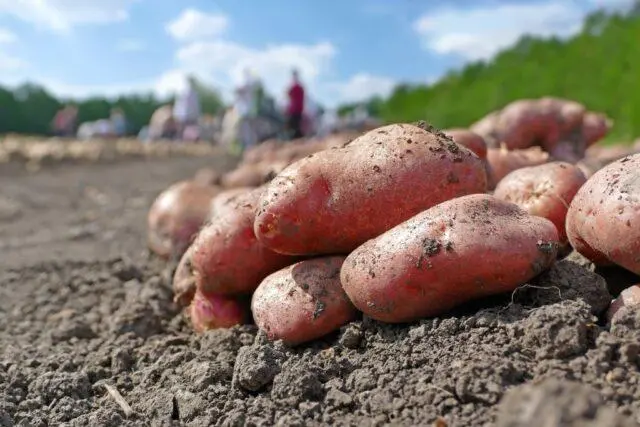
Ramona tastes like potatoes of the Nevsky variety (Nevskiy)
Gala
Gala (Gala) – refers to potato varieties for the Moscow region and for sandy soil. Considered mid-early, matures in 65-80 days. The tubers have good commercial qualities, their weight ranges from 70 to 120 g, the number of eyes is small.

Gala – a table variety of potatoes with excellent taste
Rodrigo
Variety Rodrigo (Rodrigo) has an attractive appearance. Outside, the potato is colored red, inside the creamy pulp. The variety is unpretentious and stable, can be grown on sandy soil. It is productive, well stored, rarely exposed to disease.
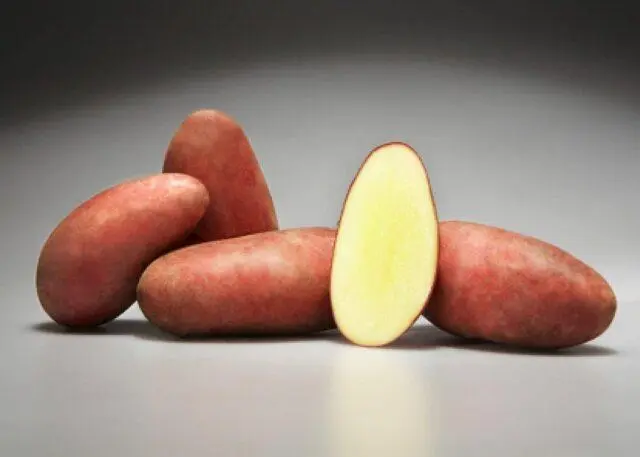
The Rodrigo variety was obtained thanks to the work of German breeders
Growing potatoes in sandy soil
In order for a potato to grow well on sand, it needs to have a specific structure of the root system. It should go deep into the ground and from there be saturated with moisture and useful substances. In addition, it is important to properly organize crop care and planting in accordance with agrotechnical requirements.
Preparing the soil for planting
The main stage of planting potatoes is the preparation of the soil. The site should be taken care of since the fall, thoroughly cleaned of weeds and dug up. If the earth is sandy, then it is enough to go deep by 15 cm, and it is advisable not to turn the layer over. Fertilizing is also best done before winter. The ideal solution would be to add manure or compost at the rate of 10 kg per 1 square meter.
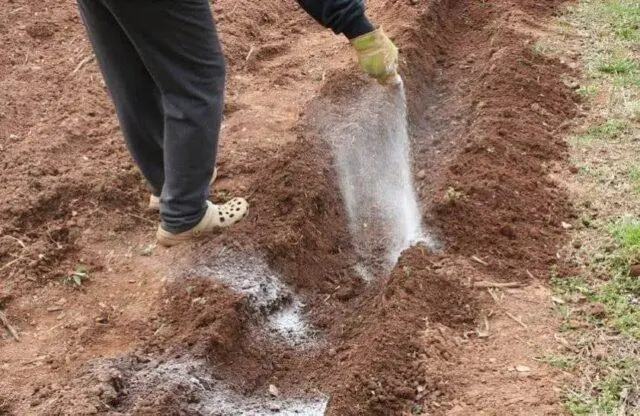
It is not recommended to break the bed on sandy soil.
Growing potatoes in the sand is practiced in different countries, as well as in many regions of Our Country.
Planting potatoes in the sand
When the weather outside becomes warm enough and the soil warms up to + 12-14 ° C, usually in early May, it will be possible to start planting. The technology looks like this:
- Furrows are made on the site at a distance of 0,7 m from each other, with a depth of about 30 cm.
- Pour nitroammophoska on the bottom.
- Mix fertilizer and soil with a hoe.
- Sprouted tubers are laid out with an interval of 30 cm with sprouts up.
- They fall asleep with earth.
Aftercare
Caring for potatoes on sand is much easier than on regular soil. On such soil, due to its amazing composition, weeds practically do not grow, it does not need frequent loosening. Regularly only watering and hilling is required.
The soil should be moistened as it dries, often, especially during the flowering period of the crop, but not excessively, since excess moisture is harmful to the plant. During a drought, water from a flat surface evaporates more slowly, therefore, when watering, it is more economical to spend it on holes than to pour between ridges.
It is also important to periodically hill the plantings so that moisture is directed to the roots of the potatoes. In the heat, if the ridges are high, it is allowed not to pour them, but only loosen them a little.
It is useful to feed the plantings several times a season. It is best to use chicken manure or manure diluted in water for this.
Conclusion
Potato varieties for sandy soil were bred taking into account all its nuances. If you plant tubers of the desired variety in such soil and carry out the recommended care for them, the harvest will be large and of high quality. Potatoes of any variety have always been and remain the favorite vegetable of all generations. It has an excellent taste and is available for consumption in different forms.









